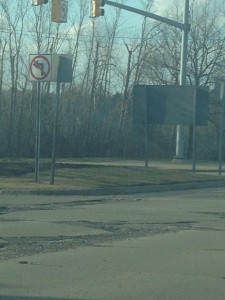Despite Senate Transportation Action, House Stymies Progress
July 30th, 2015 | By: America's Infrastructure Report Card
During the last two months, the Senate made good use of its time to craft a multi-year surface transportation bill with an increase in funding. As is often the way for Congress, it still came down to the wire. For over a week, the U.S. Senate has been in a mad dash to complete its work on a multi-year surface transportation bill before the looming July 31 legislative deadline hits. With the help of ASCE members, fellow coalition members including Associated General Contractors, the American Road and Transportation Builders Association, the U.S. Chamber of Commerce, many other groups, and the public, the Senate was successful in doing so – with even a little bit of time to spare. Today the Senate delivered to the House for consideration a six-year, $350 billion road, bridge and transit policy bill that provides three-years of dedicated funding and boosts current investment levels. The only problem? The House is not in session to take it up and pass it before the Friday deadline. In the Congressional equivalent of ding-dong-ditch, yesterday the House passed and sent to the Senate a three-month program extension just as House members left town for August recess, which meant the Senate had no option but to pass the three-month extension in order to avoid a program shutdown on July 31. So in the end the Senate was successful in doing its work, but was unable to get their effort signed into law by the July 31 deadline because the House left town early and refused to take it up. The Senate bill’s funding increases for highway and transit are a step in right direction, but still far below the investment levels America needs to address its aging roads, bridges, and transit systems. However, when compared to the horrible status-quo that the federal program finds itself in – a seemingly endless cycle of short-term extensions combined with a continued deterioration of the purchasing power of transportation dollars – the Senate bill was the most promising legislation proposed during the two-month extension. “In the next three months, ASCE urges the House and Senate to work through their policy differences and continue the legacy of the Highway Trust Fund,” said Tom Smith, ASCE’s executive director. “This short-term extension needs to be the last and we believe it can be, so long as Congress moves the nation forward by working together in a bipartisan way to finish their work on improving America’s surface transportation infrastructure.” Of note the Senate bill: • Provides six years of policy reforms and contract authority for highways and transit programs, thus ending the cycle of short-term, multi-month program extensions; • Provides three years of dedicated revenue to the Highway Trust Fund (HTF) so states can deliver more long-term projects; • Increases funding levels for both highway, transit and passenger rail programs in order to reduce our nation’s maintenance and construction backlog; • Provides for a new national dedicated freight program to improve goods movement; • Contains bipartisan permitting reforms that would set deadlines for project decisions, increase transparency and reduce litigation delays; and • Contains a federal pilot program for future user-fee revenue generating systems like those currently being tested in some states regarding vehicle miles traveled (VMT). While the summer legislative battle is over and victory was confined to the U.S. Senate, transportation advocates will take the August break and recharge our batteries to be ready for the final fall push when Congress is back in September. Please take a moment to see how your Senator voted and thank him/her on their leadership this July. We will need their support again soon enough once a final House and Senate compromise comes together.New Game Changers Report Identifies Top Trends Shaping Infrastructure
July 23rd, 2015 | By: Becky Moylan
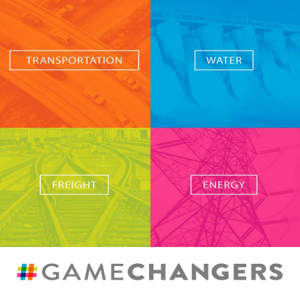 The challenges our infrastructure faces are chronicled frequently on this blog and in the media. The Highway Trust Fund heading toward insolvency (again). Water main breaks occurring every two minutes. Congested roadways causing us each to lose time and waste gas.
But that’s only half the story. Today, we released our new Infrastructure #GameChangers report, which identifies the top trends in energy, freight, transportation and water that are transforming the way infrastructure is designed, planned, and built.
The communities that chose to make the investment across the country are reaping the benefits, by preparing for tomorrow’s challenges and positioning themselves for economic growth.
Here are some of the trends explored in the report:
Transportation
The challenges our infrastructure faces are chronicled frequently on this blog and in the media. The Highway Trust Fund heading toward insolvency (again). Water main breaks occurring every two minutes. Congested roadways causing us each to lose time and waste gas.
But that’s only half the story. Today, we released our new Infrastructure #GameChangers report, which identifies the top trends in energy, freight, transportation and water that are transforming the way infrastructure is designed, planned, and built.
The communities that chose to make the investment across the country are reaping the benefits, by preparing for tomorrow’s challenges and positioning themselves for economic growth.
Here are some of the trends explored in the report:
Transportation
- Ridesharing and transit apps
- Robotic inspections
- Bus rapid transit
- Smart parking systems
- Accelerated bridge construction
- LiDAR and drone technology
- Integrating renewables
- Preparing for blackouts with resilience
- Extracting energy from waste
- Recycled and reclaimed water
- Desalinated water
- Public-private partnerships for inland waterways
- Preparing for the Panama Canal expansion
Five (More) Myths About the Highway Trust Fund
July 15th, 2015 | By: Becky Moylan
1. Devolving the federal program to the states is a viable option Devolution is the idea of eliminating the federal government’s ability to collect the current 18.4 cents per gallon in federal gasoline taxes (absent a few cents to remain dedicated toward maintaining the Interstate Highway System) and transferring all authority over these programs to the state. This act would represent one of the single greatest unfunded mandates at nearly $50 billion—a violation of the Unfunded Mandates Reform Act of 1995. The current system empowers states by making the federal role a reimbursement process, allowing states to make their own planning and building decisions while also having some overall coordination and safety standards among states. Many states have raised their own gas taxes recently, essentially catching up the purchasing power of their current gas tax rates with inflation since they were last adjusted. For example, Iowa had not raised its gas tax since 1989 and its 10-cent increase was a hard fought battle. To ask states to pick up the tab for the federal role—which on average is 52% of the state’s capital budget each year—would be a huge burden to states’ budgets. On average, states would need to raise their gas tax by 23 cents or significantly cut their transportation program. It would not be the easy task that the proponents of devolution make it out to be. Instead, our roads, bridges and transit would continue to deteriorate and the backlog of projects would grow longer and the system will become patchwork if some states fail to make investments. 2. Transportation has become a partisan issue Transportation has historically been a bipartisan issue, and passing a multi-year, properly funded transportation bill will only be accomplished through bipartisan cooperation. In the past year, there have been several bipartisan proposals to help address the Highway Trust Fund crisis. Senators Bob Corker (R-TN) and Tom Carper (D-DE) have proposed a plan. In the House, Reps. Renacci (R-OH), Pascrell (D-NJ), Ribble (R-WI), and Lipinski (D-IL) have introduced the Bridge to Sustainable Infrastructure Act. Before the Independence Day Recess, the Senate Committee on Environment & Public Works unanimously passed the DRIVE Act out of committee. Both sides of the aisle acknowledge that our transportation system is ailing and that something must be done. Fixing the Highway Trust Fund is, at its heart, a bipartisan endeavor. 3. Flat funding is fine If Congress does not grow the program and increase federal funding levels in the next multiyear transportation bill, then our economy will continue to suffer. In 2011, ASCE released an economic study on transportation titled Failure to Act, which details how underinvesting in transportation is a drag on our economy. The study outlined what the economic ramifications will be by 2020 if status quo funding levels continue. Among them, we revealed that America’s GDP will underperform by $897 billion in total by 2020 and each family’s budget loses $1,060 each year in disposable income—money every American household has already lost and will continue to lose if we don’t improve our transportation network. Underinvestment in transportation will cost our economy 877,000 jobs in the year 2020. Continuing to fund at current levels for the next several years will neither improve our aging transportation network, nor grow the economy 4. A gas tax is not politically possible Several states have recently acted in bipartisan fashion to pass gas tax increases. In those states, 90% of those who voted in favor the gas tax increase got reelected in the following election. And many were conservative states, like Arkansas, which needed to see a high return on investment. A poll by the Mineta Transportation Institute demonstrated that people are willing to pay more in gas taxes if it goes to improving transportation. This study shows that voters recognize the connection between potholed roads and aging bridges and underinvestment. In addition, the impact of a gas tax on gas prices is not as direct as sometimes thought. A recent study by ARTBA finds that gas tax increases have very little impact on the overall price of a gallon of gas. CBO projects that the Highway Trust fund’ revenue shortfall will be $8 billion at the end of this year and be between $85 billion and $90 billion by May 31, 2021. There is no reason to add to the national debt and our burden on future generations when raising the gas tax is a deficit-neutral options. 5. We can kick the can again Two-month stopgaps hurt the economy and American business. For two consecutive years, the summer highway and transit construction season has taken a hit because of the uncertainty surrounding the federal program. For example, just in the last few weeks and months, several states have announced they are canceling or delaying projects until Congress passes a multi-year bill. These short-term extensions not only delay existing projects in the pipeline but prevent major projects from being considered in light of the lack of a clear federal funding commitment. Ultimately the lack of certainty hinders our nation’s ability to dream big on ways to modernize our infrastructure and create the foundation for the 21st century economy. See the original posts 10 Myths About the Highway Trust Fund.Flat Funding is Flat Outrageous
May 7th, 2015 | By: Becky Moylan
As the deadline to reauthorize the federal surface transportation bill nears, the measure of success for many involved seems to be maintaining the status quo. Last week, leaders in the U.S. House of Representatives began touting “flat funding” as an accomplishment that Congress must work to achieve. But it’s flat out not. Here are some of the things that will happen if Congress simply continues the status quo over the next few years, from ASCE’s economic study on transportation:- It will cost each American family’s budget $1,060 every year through at least 2020
- America will lose more than 876,000 jobs by 2020
- 234,000 jobs will force workers to take paycuts in 2020
- S. exports will drop by $28 billion in total by 2020
- America’s GDP will underperform by $897 billion in total by 2020
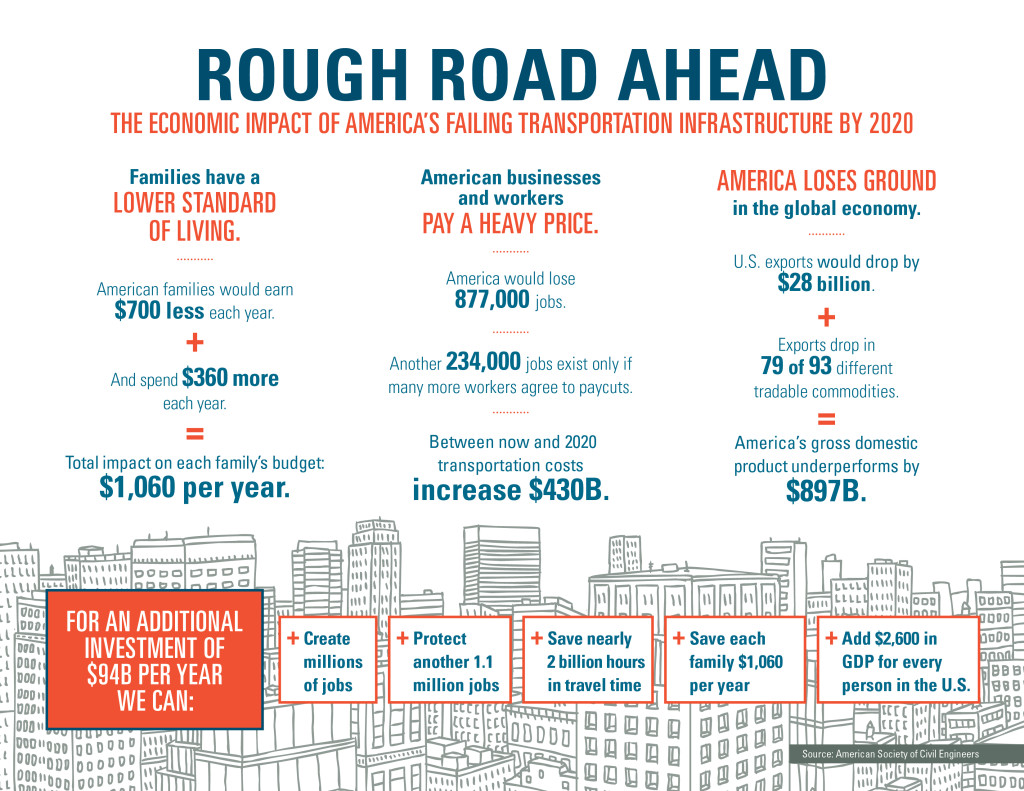 A multiyear bill that continues the same amount of funding we’ve had since 2005 through SAFETEA-Lu is the opposite of aspiration. It will not help improve our low Report Card grades for surface transportation, and will do little to strengthen the economy. However, there is a way to not only fill the funding hole of the Highway Trust Fund but also grow the system. By increasing the federal gas tax, we can start investing in the projects America needs to have in place in order to continue to compete globally in the21st century. Every state has dozens of new construction projects that they would like to make a reality if they only had increased investment from all levels of government. Here’s our chance.
To fill the current federal funding gap and grow the federal Highway Trust Fund to address current documented needs, Congress should raise the gas tax by at least 20 cents. This would be the first increase since 1993, and the bump would recoup what has been lost due to inflation and increase funding. For the average driver, it will cost about $187 more a year*. In contrast, right now each motorist is paying $324 a year in additional repairs and operating costs. In addition, Americans spend an average 34 hours a year stuck in traffic, costing the U.S. economy $101 billion in wasted fuel and lost time annually. It’s a savings for your wallet by staying out of the auto mechanic shop. It’s an even bigger savings as it protects that $1,060 mentioned above.
There is a lot at stake if we merely continue with the same level of funding of the past 10 years for the next five. It will hurt your personal finances, hurt our already aging transportation system and do little to benefit our economy. Let’s increase our investment so that Congress truly fixes the Trust Fund in a way that allows us to modernize our transportation system.
Join ASCE in telling your Senators and Representative that you expect their leadership in passing a long-term, sustainable fix to the Highway Trust Fund that includes an increased investment to modernize the transportation system.
*calculated based on 18 gallon tank x 20 cents x 52 fill-ups a year (once a week)
A multiyear bill that continues the same amount of funding we’ve had since 2005 through SAFETEA-Lu is the opposite of aspiration. It will not help improve our low Report Card grades for surface transportation, and will do little to strengthen the economy. However, there is a way to not only fill the funding hole of the Highway Trust Fund but also grow the system. By increasing the federal gas tax, we can start investing in the projects America needs to have in place in order to continue to compete globally in the21st century. Every state has dozens of new construction projects that they would like to make a reality if they only had increased investment from all levels of government. Here’s our chance.
To fill the current federal funding gap and grow the federal Highway Trust Fund to address current documented needs, Congress should raise the gas tax by at least 20 cents. This would be the first increase since 1993, and the bump would recoup what has been lost due to inflation and increase funding. For the average driver, it will cost about $187 more a year*. In contrast, right now each motorist is paying $324 a year in additional repairs and operating costs. In addition, Americans spend an average 34 hours a year stuck in traffic, costing the U.S. economy $101 billion in wasted fuel and lost time annually. It’s a savings for your wallet by staying out of the auto mechanic shop. It’s an even bigger savings as it protects that $1,060 mentioned above.
There is a lot at stake if we merely continue with the same level of funding of the past 10 years for the next five. It will hurt your personal finances, hurt our already aging transportation system and do little to benefit our economy. Let’s increase our investment so that Congress truly fixes the Trust Fund in a way that allows us to modernize our transportation system.
Join ASCE in telling your Senators and Representative that you expect their leadership in passing a long-term, sustainable fix to the Highway Trust Fund that includes an increased investment to modernize the transportation system.
*calculated based on 18 gallon tank x 20 cents x 52 fill-ups a year (once a week)
Tags: gas tax, highway trust fund, surface transportation
No Comments »
Ideas to Fix the Trust Fund
April 17th, 2015 | By: Olivia Wolfertz
Congress returned to Washington this week after a two week recess, facing a new level of urgency to Fix the Highway Trust Fund before last summer’s extension ends on May 31. A few members of Congress wasted no time upon their return to the Hill to start raising this issue and offering their solutions. On Thursday a bipartisan group of House members filed legislation to increase the federal gas tax to match inflation in order to finance our much-needed transportation investment. The Bridge to Sustainable Infrastructure Act would increase the gas tax to recoup its purchasing power, thus generating $27.5 billion that can be used to pay for nearly two years’ worth of transportation. In the release announcement explaining what prompted the lawmakers to propose this solution, Reps. Jim Renacci (R-Ohio), Bill Pascrell (D-N.J.), Reid Ribble (R-Wis.), and Dan Lipinski (D-Ill.) explained “We refuse to pass on the liability of our deteriorating roads and bridges to our children and grandchildren. The longer we wait to fix our crumbling infrastructure, the more it will cost in the long-run,” in a joint statement about the bill. On April 15, Representative Delaney and Representative Hanna wrote a letter to their fellow members of Congress emphasizing the importance of committing to a long-term sustainable funding bill and supporting their bill, the Infrastructure 2.0 Act that has bipartisan support to repatriate overseas capital for domestic infrastructure repairs. On the Senate side, Sen. Rand Paul (R-Ky.) and Sen. Barbara Boxer (D-Calif.) have a bill to replenish the Highway Trust Fund, also through repatriation. All three of these efforts exemplify that infrastructure has historically been a bipartisan success, and that finding a solution to federal transportation investment is no different. Finding a long-term federal transportation funding solution affects each state and its ability to effectively plan projects. According to the U.S. Department of Transportation, Arkansas, Delaware, Georgia, Mississippi, Tennessee and Wyoming have already postponed transportation projects because of funding delays. With 44 days until the highway and transit policy expires, it is crucial these conversations lead to action that ensures a sustainable, long-term funding solution to #FixTheTrustFund.Tags: gas tax, highway trust fund, surface transportation
No Comments »
Michigan Must Say Yes to Safer Roads
April 8th, 2015 | By: Becky Moylan
In Michigan, a common saying is “there are two seasons: winter and road construction.” Rough winters and underinvestment for the past 50 years have led the Great Lakes state to have some of the worst roads in the nation. And while construction season may seem constant during the warmer months, the truth is currently the state cannot keep up with meeting the needs to maintain or improve roads and bridges. The continual underinvestment has led to a backlog of needs and safety issues. Gov. Rick Snyder has been advocating for the past few years that something needs to be done to change the state’s trajectory. Last December, in an eleventh hour deal, the state legislature decided to punt the decision to the voters. In just under a month, the option to increase funding for roads will be considered at the polls. If passed, Proposal 1 would raise $1.2 billion a year to be invested exclusively into transportation. As I drove around my hometown last week, this seemed like a no-brainer. I’ve included a couple photos, but it does not fully do the problem justice. Many roads are in such bad shape that debris lines the shoulders of the street, rubble that is a byproduct of the potholes and gaping cracks in the pavement. The same month state lawmakers devised Prop 1, TRIP released a study revealing poor roads were costing the average Michigan driver $539 a year —and remember it’s the Motor City, people love their cars and many work for the auto industry. In some areas the extra vehicle operation costs that include accelerated vehicle depreciation, additional repairs, increased fuel consumption and tire wear costs drivers as much as $851 a year. Here is how Proposal 1 works:- Raise the state sales tax rate by one penny, from 6 percent to 7 percent
- Implement a series of laws that exempt fuel from the sales tax, then impose a higher fuel tax whose revenue would be used exclusively for transportation
- Raise vehicle registration fees to increase transportation funding
- Raises $1.2 billion each year to increase investment in transportation—bringing Michigan more in line with the transportation investment of neighboring states
- Ensure every penny raised at the gas pump goes to improving Michigan’s roads, bridges and public transit
- Protect taxpayers by getting road builders to give warranties on the roads they build
Tags: bridges, Michigan, roads, surface transportation, transit
2 Comments »
What Does the Foxx Say?
February 19th, 2015 | By: Becky Moylan
While it might not be as amusing as this, this week U.S. Transportation Secretary Anthony Foxx said that a quality transportation network is important to the future of the nation and he urged Congress to quickly adopt a multi-year surface transportation bill. Secretary Foxx did so as he rolled through a few southern states in a bus he named the Grow America Express, a nod to the name of the Obama Administration’s surface transportation authorization bill. Foxx made visits to multiple states to promote the administration’s plan, at times accompanied by Vice President Joe Biden in both North and South Carolina.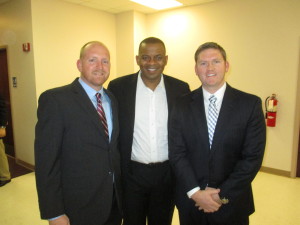
Pictured from L to R: David Crombie, E.I., A.M.ASCE (ASCE Tallahassee Branch Vice President), USDOT Secretary Anthony Foxx, and Jeremy Clark, P.E., M.ASCE (ASCE Tallahassee Branch President)
- Tallahassee, FL: David Crombie, E.I., A.M.ASCE (ASCE Tallahassee Branch Vice President) and Jeremy Clark, P.E., M.ASCE (ASCE Tallahassee Branch President)
- Charleston, SC: Chuck Black, P.E., M. ASCE (ASCE South Carolina Section, Eastern Branch Director)
- Columbia, SC: Edward Owens, P.E, M.ASCE (ASCE South Carolina Section President) and Petrina Butler, P.E., M.ASCE (ASCE Upstate South Carolina Branch President) and Jennifer Muster, P.E.,M.ASCE (ASCE Upstate South Carolina Branch)
- Charlotte, NC: Daniel Bridges, P.E, M.ASCE (ASCE North Carolina Section President)
- Raleigh, NC: Robert Cagle, P.E, F.ASCE (ASCE Region 4 Governor)
- Washington, DC: Veronica Davis, P.E, M.ASCE (ASCE Transportation Policy Committee member) and Robert Victor, P.E, F.ASCE (ASCE Committee on America’s Infrastructure member)
Tags: highway trust fund, surface transportation
No Comments »
Moving Goods Moves the Economy
February 11th, 2015 | By: Becky Moylan
On Tuesday, the U.S. Senate Commerce Transportation subcommittee held a hearing on the role of U.S. ports, titled “Keeping Goods Moving.” Recently, the west coast ports have experienced major backups. These delays and their economic impact could be a glimpse of things to come if we fail to modernize our freight transportation network to meet growing demands. Sen. Deb Fischer (R-NE), Chairman of the subcommittee, opened the hearing saying “To grow the economy and create new jobs, we need an efficient and reliable intermodal transportation network.” The testimony of representatives from BNSF, Cargill, the Coalition for America’s Gateways and Trade Corridors (CAGTC), and infrastructure consulting firm Moffatt and Nichol, demonstrated the need for a strong intermodal transportation system that works together to move goods along the supply chain. Sen. Richard Blumenthal (D-CT), ranking member of the subcommittee, commented that “No region is an island” as he reiterated the importance of investing in infrastructure that effectively moves freight. During the testimony, Mr. John Greuling, representing the CAGTC pointed to how much more other countries, such as China and Canada, are investing in their transportation networks. The subcommittee’s exploration of this topic demonstrates the growing understanding that our infrastructure works as a system whose condition has huge implications for the nation’s economy. ASCE’s Failure to Act economic study on Airports, Inland Waterways and Marine Ports found that with a $15.8 billion investment per year until 2020, the U.S. can protect $270 billion in U.S. exports, $687 billion in GDP and 738,000 jobs annually. Congress should identify additional ways that freight mobility investments can be prioritized and funded to ensure that America’s economy can compete in the global marketplace. A fix to the Highway Trust Fund and increased investment levels for our nation’s transportation system would go a long way towards achieving this goal.Chime in on Wednesday to Fix the Trust Fund
February 9th, 2015 | By: Becky Moylan
As Congress continues the debate on the best way to #FixTheTrustFund and modernize America’s roads, bridges, and transit, USDOT Sec. Foxx and Transportation & Infrastructure Chairman Bill Shuster are heading to Twitter for a bipartisan “townhall” to discuss surface transportation. The town hall, a first of its kind, will be Wednesday, Feb. 11 after Sec. Foxx concludes his testimony in from of the U.S. House of Representatives’ Transportation & Infrastructure Committee, around 12 p.m. ET.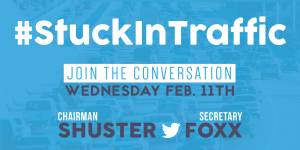 Now it’s up to you to ask your questions about transportation investment and voice your support for a long-term funding solution. To get the conversation rolling, here are some key facts from the 2013 Report Card for America’s Infrastructure that would make great tweeting material. To join in the conversation, use #StuckInTraffic anytime between now and Wednesday.
Now it’s up to you to ask your questions about transportation investment and voice your support for a long-term funding solution. To get the conversation rolling, here are some key facts from the 2013 Report Card for America’s Infrastructure that would make great tweeting material. To join in the conversation, use #StuckInTraffic anytime between now and Wednesday.
- One in nine U.S. bridges is structurally deficient.
- 45% of Americans don’t have access to public transportation.
- 42% of major urban highways are congested, costing the economy $101B a year.
- 32% of America’s major roads are in poor or mediocre condition.
- Americans spend nearly a week’s worth of vacation time—34 hours—stuck in traffic each year.
- If we don’t improve our transportation infrastructure, each family’s budget will lose $1060 a year by 2020.
- If we don’t improve our transportation infrastructure, America will lose 877,000 jobs by 2020.
Tags: bridges, congress, highway trust fund, roads, surface transportation, transit
No Comments »
ASCE Endorses an UPDATE to the Gas Tax
February 5th, 2015 | By: Becky Moylan
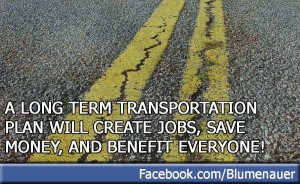 Twenty-two years ago ‘I Will Always Love You’ was the top song on the Billboard charts, a loaf of bread cost $0.75, and Unforgiven won the Oscar for Best Picture. A lot has changed since then, yet the gas tax rate that funds our transportation system has remained the same. Yesterday, the American Society of Civil Engineers stood with Congressman Earl Blumenauer (D-OR) in support of a bill that would change that.
Rep. Blumenauer, along with more than 20 cosponsors, introduced the “Update, Promote, and Develop America’s Transportation Essentials” (UPDATE) Act. UPDATE offers a long-term, sustainable solution to fix the Highway Trust Fund by increasing the gas tax to recoup the purchasing power it has lost due to inflation since 1993. The bill proposes the gas tax to be raised 5 cents per year for the next three years, then tie it to inflation.
With one in nine bridges in the U.S. structurally deficient and congestion on 42 percent of America’s urban highways, our country is in need of an increased investment in our transportation system.
ASCE’s Executive Director Tom Smith joined representatives from the U.S. Chamber of Commerce, the American Trucking Associations, and other groups to support the bill. In his remarks, Smith said:
“The federal motor fuels tax, which funded the creation of America’s Interstate Highway System, hasn’t been increased in over 20 years and has lost more than one-third of its purchasing power. Essentially, we’re trying to pay for 2015 infrastructure with 1993 dollars.
“This bill will provide long-term, sustainable funding to meet identified needs and revitalize our nation’s transportation network for decades to come.”
Without Congressional action, the Highway Trust Fund’s authorization expires in May, and the funding will run out in the summer—during the height of road construction improvement season. Rep. Blumenauer’s bill would ensure the trust is restored in the Highway Trust Fund, by allowing states to effectively plan long-term projects knowing the federal government will be a continued partner in funding.
Twenty-two years ago ‘I Will Always Love You’ was the top song on the Billboard charts, a loaf of bread cost $0.75, and Unforgiven won the Oscar for Best Picture. A lot has changed since then, yet the gas tax rate that funds our transportation system has remained the same. Yesterday, the American Society of Civil Engineers stood with Congressman Earl Blumenauer (D-OR) in support of a bill that would change that.
Rep. Blumenauer, along with more than 20 cosponsors, introduced the “Update, Promote, and Develop America’s Transportation Essentials” (UPDATE) Act. UPDATE offers a long-term, sustainable solution to fix the Highway Trust Fund by increasing the gas tax to recoup the purchasing power it has lost due to inflation since 1993. The bill proposes the gas tax to be raised 5 cents per year for the next three years, then tie it to inflation.
With one in nine bridges in the U.S. structurally deficient and congestion on 42 percent of America’s urban highways, our country is in need of an increased investment in our transportation system.
ASCE’s Executive Director Tom Smith joined representatives from the U.S. Chamber of Commerce, the American Trucking Associations, and other groups to support the bill. In his remarks, Smith said:
“The federal motor fuels tax, which funded the creation of America’s Interstate Highway System, hasn’t been increased in over 20 years and has lost more than one-third of its purchasing power. Essentially, we’re trying to pay for 2015 infrastructure with 1993 dollars.
“This bill will provide long-term, sustainable funding to meet identified needs and revitalize our nation’s transportation network for decades to come.”
Without Congressional action, the Highway Trust Fund’s authorization expires in May, and the funding will run out in the summer—during the height of road construction improvement season. Rep. Blumenauer’s bill would ensure the trust is restored in the Highway Trust Fund, by allowing states to effectively plan long-term projects knowing the federal government will be a continued partner in funding.
Tags: gas tax, highway trust fund, surface transportation
No Comments »



 */ ?>
*/ ?>





